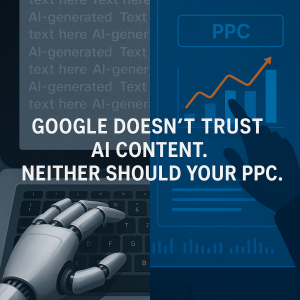Why Google’s War on AI Content Proves the Value of Human-Led PPC
Artificial Intelligence is everywhere. It is writing blogs, spitting out ad copy, and sometimes even pretending to be your intern who never takes lunch breaks. But when it comes to Google? They have made their position very clear: AI-written content is not the future they want to serve users.
For businesses trying to win visibility, that is more than a minor algorithm update. It is a warning. You cannot trick the system with cheap shortcuts. You need expertise, originality, and strategy. The kind you get when you work with a specialist PPC agency.
Google’s Problem With AI Content

Google does not care if your content is fast. They care if it is useful, accurate, and written with depth. AI text often comes out flat: repetitive phrasing, generic points, no real insight. That hurts user trust, and Google knows it.
So they have trained their algorithms to spot the difference. Tell-tale signs include robotic sentence structure, lack of originality, and arguments that read like a copy of a copy. The result? Websites relying on AI-only content can see rankings fall, traffic collapse, and visibility disappear.
For brands that live and die by search results, that is not an inconvenience. It is a revenue problem.
What This Means for Marketers
If you have built your digital strategy around automation, you are in trouble. Because the message is simple: authenticity wins. Companies that invest in human expertise, whether it is skilled writers or a partner providing full PPC management services, are the ones who will stand out.
Yes, AI can speed up production. But speed without substance does not convert. Marketing is about persuasion, not just filling pages.
Why PPC is Different
Here is the thing: SEO content lives at Google’s mercy. One update and you are invisible. Pay-per-click campaigns, though, give you immediate visibility, total control, and measurable ROI. A properly run PPC campaign does not gamble on whether the algorithm approves of your sentence structure. It puts your brand in front of the right people at the exact moment they are searching.
That is why partnering with a PPC agency matters. It is not just about pressing start on ads. It is about building the right keyword strategy, writing copy that earns clicks, optimising landing pages for conversions, and tracking every pound spent to prove ROI.
The Human Edge
Google’s stance on AI is also a reminder that human creativity still drives results. The best campaigns combine data and tech with ideas that connect. That is where the human touch wins: nuanced messaging, creative hooks, and strategic targeting.
A good PPC agency uses automation where it helps, such as bid strategies, testing, and reporting. They never outsource the thinking. The mix of human judgment and machine efficiency is what separates mediocre campaigns from ones that scale profitably.
The Future
Will AI get better? Absolutely. It will generate cleaner copy, smarter targeting, and maybe even campaign structures that are hard to tell apart from human work. But Google’s mission will not change. Their priority is always content that adds value and ads that deliver relevance.
So the businesses that succeed will be the ones that adapt. They will use AI tools, but they will keep humans at the wheel. They will treat PPC not as a checkbox but as a growth engine, managed with intent, strategy, and constant optimisation.
Conclusion
Google has made it clear: shortcuts are dead. If you want visibility, traffic, and conversions, you need expertise and authenticity guiding your strategy. That is exactly what a trusted PPC agency delivers. And if you are serious about scaling, PPC management services give you the structure, insights, and execution needed to keep your campaigns performing at their peak.


